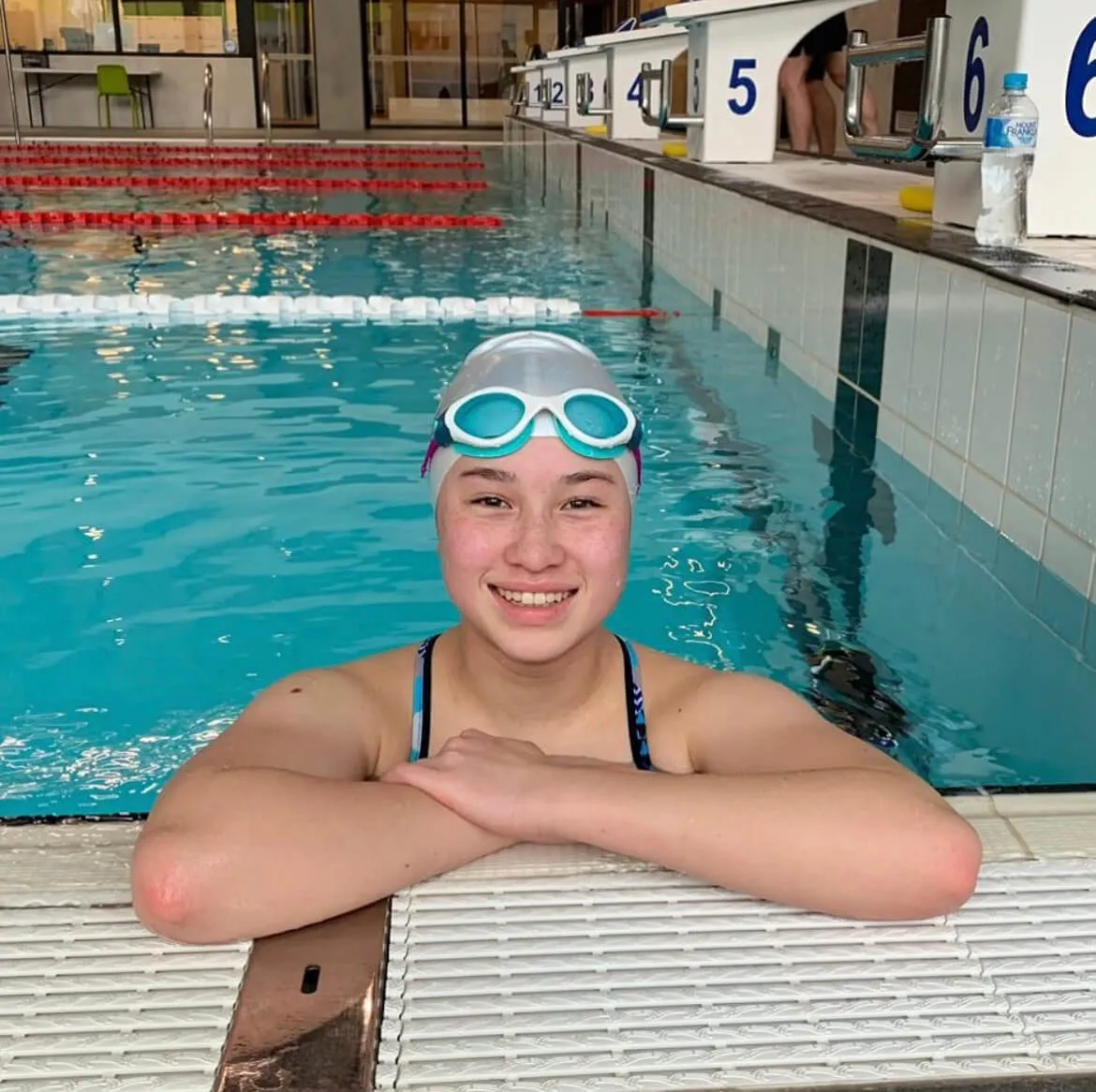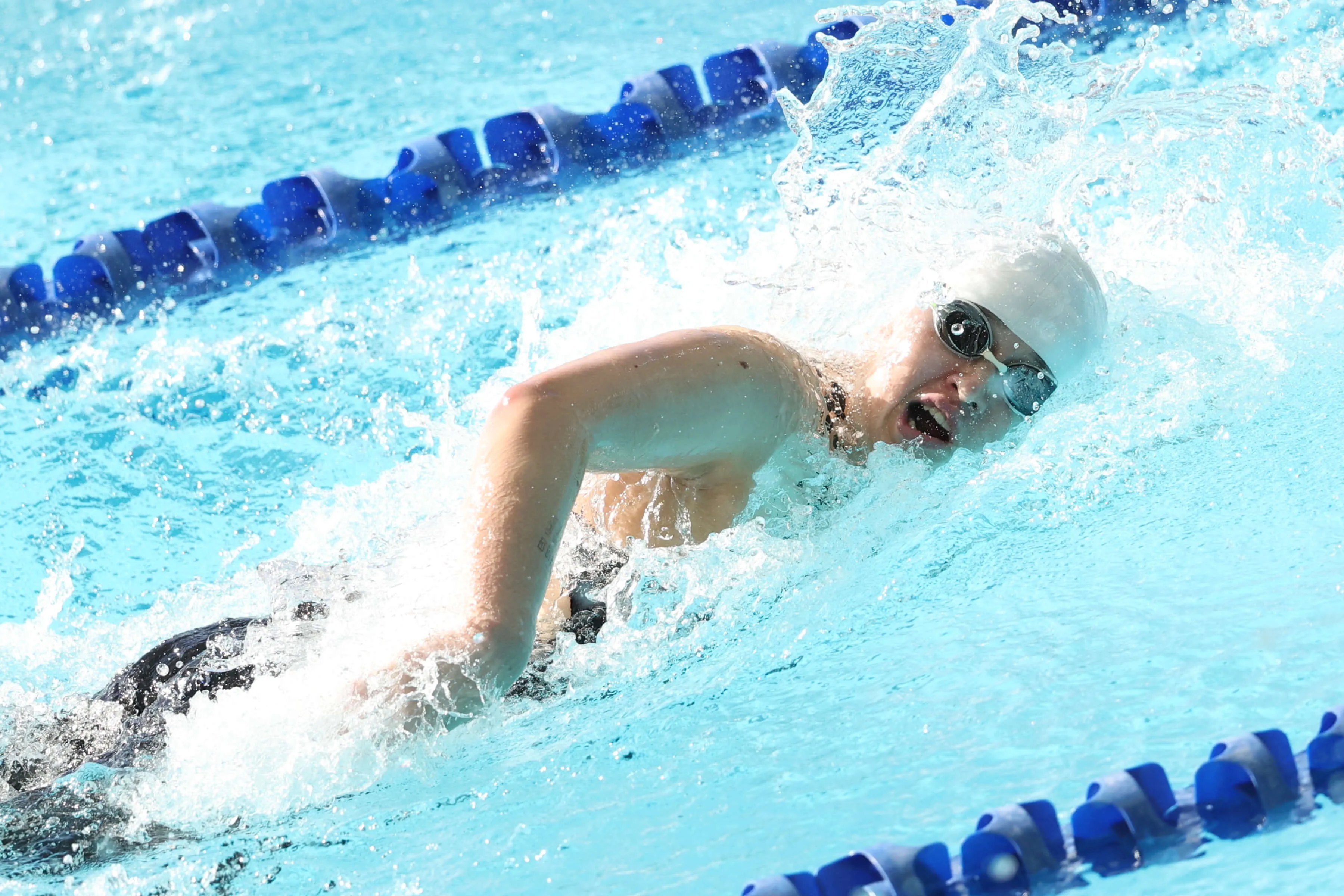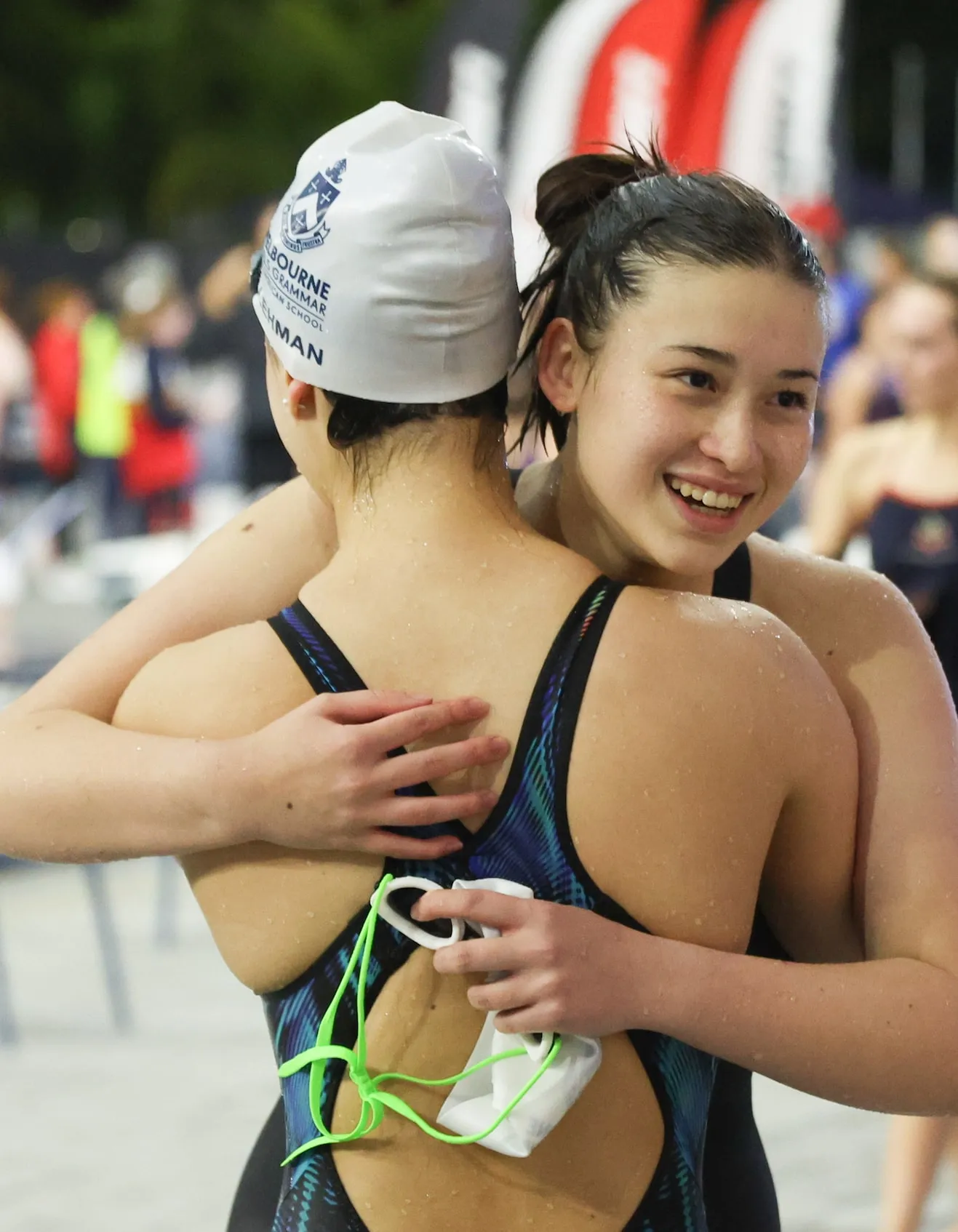

Charlotte Dalton hugging teammate Aria Lehman after her swim at GSV finals night.


Charlotte Dalton hugging teammate Aria Lehman after her swim at GSV finals night.
Boosting Learning: The Reward is in the Struggle
At the GSV Swimming Finals night in early April, I witnessed one of the gutsiest, most determined swims I’ve seen at this carnival over the past five years. Charlotte, one of our Year 12 students, anchored the Senior Medley Relay. Diving into the pool sitting in 4th place and a good three body lengths behind the nearest competitor, Charlotte brought the team home to touch the wall in a close 3rd place. This isn’t where the story starts though – it won’t even be where it ends.

Four years ago, a routine swimming-specific musculo-skeletal screening with a physiotherapist uncovered a spinal condition that required Charlotte to come to terms with a management plan that would impact her lifestyle, engagement in sport, and training options. Charlotte was diagnosed with scoliosis that required her to wear a custom brace for 20-plus hours a day for the next two years – medical advice that no 13-year-old would want to hear. Despite this, Charlotte had the maturity, self-discipline, and vision to accept that two years of managing this challenge meant a lifetime of freedom from a condition that would continue to deteriorate if she left it unmanaged. And so, the only time Charlotte removed the tightly fitting brace, which hugged her torso from arm pits to her hips, was for swimming training.
The reward for her diligence and commitment was huge, not only preventing the curvature of her spine from increasing but correcting the curve to within normal ranges. Charlotte’s swim performance representing her School for the final time was nothing short of inspirational – and from what I saw – all heart!
This is a story of learning, adapting, mindset, and performance.
Four years ago, a routine swimming-specific musculo-skeletal screening with a physiotherapist uncovered a spinal condition that required Charlotte to come to terms with a management plan that would impact her lifestyle, engagement in sport, and training options. Charlotte was diagnosed with scoliosis that required her to wear a custom brace for 20-plus hours a day for the next two years – medical advice that no 13-year-old would want to hear. Despite this, Charlotte had the maturity, self-discipline, and vision to accept that two years of managing this challenge meant a lifetime of freedom from a condition that would continue to deteriorate if she left it unmanaged. And so, the only time Charlotte removed the tightly fitting brace, which hugged her torso from arm pits to her hips, was for swimming training.
The reward for her diligence and commitment was huge, not only preventing the curvature of her spine from increasing but correcting the curve to within normal ranges. Charlotte’s swim performance representing her School for the final time was nothing short of inspirational – and from what I saw – all heart!
This is a story of learning, adapting, mindset, and performance.
Four years ago, a routine swimming-specific musculo-skeletal screening with a physiotherapist uncovered a spinal condition that required Charlotte to come to terms with a management plan that would impact her lifestyle, engagement in sport, and training options. Charlotte was diagnosed with scoliosis that required her to wear a custom brace for 20-plus hours a day for the next two years – medical advice that no 13-year-old would want to hear. Despite this, Charlotte had the maturity, self-discipline, and vision to accept that two years of managing this challenge meant a lifetime of freedom from a condition that would continue to deteriorate if she left it unmanaged. And so, the only time Charlotte removed the tightly fitting brace, which hugged her torso from arm pits to her hips, was for swimming training.
The reward for her diligence and commitment was huge, not only preventing the curvature of her spine from increasing but correcting the curve to within normal ranges. Charlotte’s swim performance representing her School for the final time was nothing short of inspirational – and from what I saw – all heart!
This is a story of learning, adapting, mindset, and performance.



As coaches and teachers, it’s our great joy and privilege to see stories like Charlotte’s unfold every day, but it’s also one of our greatest challenges. The emotional ride of sport’s “dizzying highs and crushing lows” is a shared one between students, coaches, and families. These experiences unite us; they are instrumental to our learning, forging relationships, and shaping our personal growth and character.
How often do we encounter a situation in which we can take a seemingly easy path – one that feels good, comfortable, familiar, and safe – or we can choose to take the hard path – one that feels not so good, frustrating, discouraging, and difficult? An important role we play in supporting the growth and learning in our students is to foster an environment in which desirable difficulties are embedded into our daily practice.
Learning a new skill, joining a new team, taking on a different sport, being selected into an unfamiliar position on the field, coping with not being selected, injury, illness, crossing the line in last place – in sport, as in life, there are hundreds of examples in which we experience setbacks, feel exposed, where things don’t go as we had dreamed, or we are required to step outside our realm of comfort in order to grow.
As coaches and teachers, it’s our great joy and privilege to see stories like Charlotte’s unfold every day, but it’s also one of our greatest challenges. The emotional ride of sport’s “dizzying highs and crushing lows” is a shared one between students, coaches, and families. These experiences unite us; they are instrumental to our learning, forging relationships, and shaping our personal growth and character.
How often do we encounter a situation in which we can take a seemingly easy path – one that feels good, comfortable, familiar, and safe – or we can choose to take the hard path – one that feels not so good, frustrating, discouraging, and difficult? An important role we play in supporting the growth and learning in our students is to foster an environment in which desirable difficulties are embedded into our daily practice.
Learning a new skill, joining a new team, taking on a different sport, being selected into an unfamiliar position on the field, coping with not being selected, injury, illness, crossing the line in last place – in sport, as in life, there are hundreds of examples in which we experience setbacks, feel exposed, where things don’t go as we had dreamed, or we are required to step outside our realm of comfort in order to grow.

“Struggle is the price of admission if we want to grow.”
Trevor Ragan, The Learner Lab
“Struggle is the price of admission if we want to grow.”
Trevor Ragan, The Learner Lab
“Struggle is the price of admission if we want to grow.”
Trevor Ragan, The Learner Lab

What does learning look like in the pool, at the skatepark, in the jumpstart room, on the court, in the fitness hub, or on the field? It looks messy! Sometimes chaotic, generally very untidy, and almost always, plenty of mistakes. Encouraging our Grammarians – of all ages – to be on board with this discomfort is to harness the power of adopting a growth mindset.
A fixed mindset says: “I can’t do this.” A growth mindset says: “I can’t do this – yet.”
A fixed mindset says: “I have bad knees.” A growth mindset says: “I’m having some trouble with my knees whilst my body is growing, but I’m going to follow my exercise plan to overcome this pain so that I can be stronger in the future.”
A fixed mindset says: “I’m not good at sport.” A growth mindset says: “I can get better, and I can have fun.”
The Artemis Centre opened in 2017, heralding a unique opportunity for a true community hub and a place to connect our whole school in a very tangible way. It is the only building across the Merton Hall and Morris Hall campuses of MGGS where all our students (from our 3-year-olds to Year 12s), staff, parents, and alumnae gather, use, and move through daily.
The built environment provided a dedicated space for the development of Artemis Programs (including our bespoke Fit for You program). It has enabled MGGS the opportunity for the first time in its history, to establish, align, and implement a physical literacy* framework. This has been founded on achieving a graduated, functional pathway of physical development and fundamental movement skill progression from ELC to Year 12. It is a framework to strengthen the plethora of holistic benefits of the HPE curriculum.
What does learning look like in the pool, at the skatepark, in the jumpstart room, on the court, in the fitness hub, or on the field? It looks messy! Sometimes chaotic, generally very untidy, and almost always, plenty of mistakes. Encouraging our Grammarians – of all ages – to be on board with this discomfort is to harness the power of adopting a growth mindset.
A fixed mindset says: “I can’t do this.” A growth mindset says: “I can’t do this – yet.”
A fixed mindset says: “I have bad knees.” A growth mindset says: “I’m having some trouble with my knees whilst my body is growing, but I’m going to follow my exercise plan to overcome this pain so that I can be stronger in the future.”
A fixed mindset says: “I’m not good at sport.” A growth mindset says: “I can get better, and I can have fun.”
The Artemis Centre opened in 2017, heralding a unique opportunity for a true community hub and a place to connect our whole school in a very tangible way. It is the only building across the Merton Hall and Morris Hall campuses of MGGS where all our students (from our 3-year-olds to Year 12s), staff, parents, and alumnae gather, use, and move through daily.
The built environment provided a dedicated space for the development of Artemis Programs (including our bespoke Fit for You program). It has enabled MGGS the opportunity for the first time in its history, to establish, align, and implement a physical literacy* framework. This has been founded on achieving a graduated, functional pathway of physical development and fundamental movement skill progression from ELC to Year 12. It is a framework to strengthen the plethora of holistic benefits of the HPE curriculum.
What does learning look like in the pool, at the skatepark, in the jumpstart room, on the court, in the fitness hub, or on the field? It looks messy! Sometimes chaotic, generally very untidy, and almost always, plenty of mistakes. Encouraging our Grammarians – of all ages – to be on board with this discomfort is to harness the power of adopting a growth mindset.
A fixed mindset says: “I can’t do this.” A growth mindset says: “I can’t do this – yet.”
A fixed mindset says: “I have bad knees.” A growth mindset says: “I’m having some trouble with my knees whilst my body is growing, but I’m going to follow my exercise plan to overcome this pain so that I can be stronger in the future.”
A fixed mindset says: “I’m not good at sport.” A growth mindset says: “I can get better, and I can have fun.”
The Artemis Centre opened in 2017, heralding a unique opportunity for a true community hub and a place to connect our whole school in a very tangible way. It is the only building across the Merton Hall and Morris Hall campuses of MGGS where all our students (from our 3-year-olds to Year 12s), staff, parents, and alumnae gather, use, and move through daily.
The built environment provided a dedicated space for the development of Artemis Programs (including our bespoke Fit for You program). It has enabled MGGS the opportunity for the first time in its history, to establish, align, and implement a physical literacy* framework. This has been founded on achieving a graduated, functional pathway of physical development and fundamental movement skill progression from ELC to Year 12. It is a framework to strengthen the plethora of holistic benefits of the HPE curriculum.
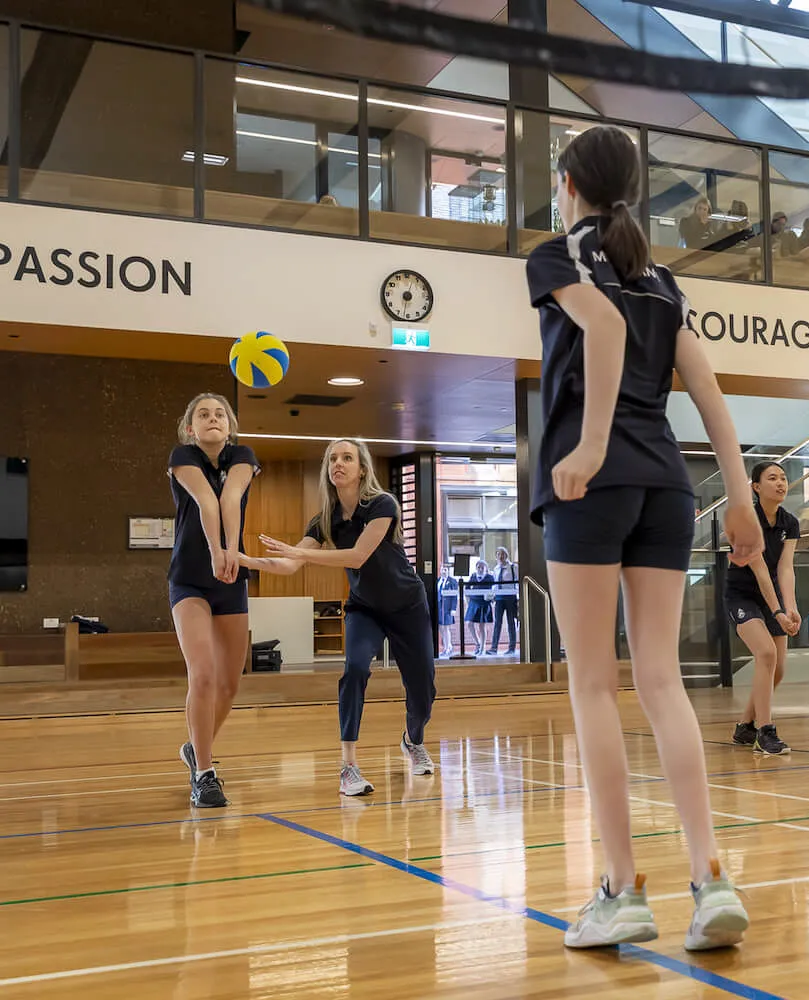

The Artemis Team Zone allows our Grammarians to learn and play a number of different sports and skills.



The Artemis Team Zone allows our Grammarians to learn and play a number of different sports and skills.
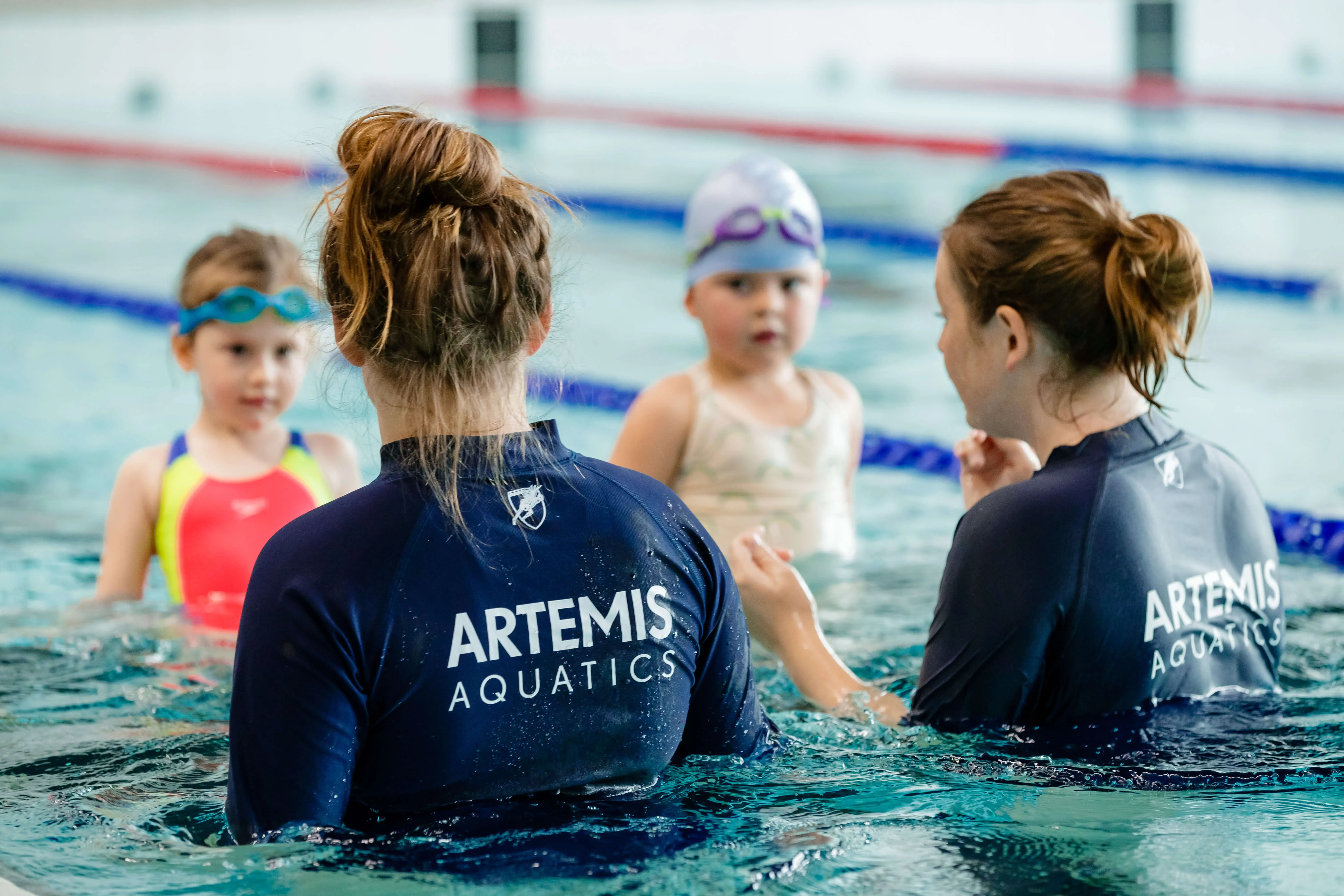

The Artemis pool is a space where coaches teach and students learn the valuable skill of swimming.
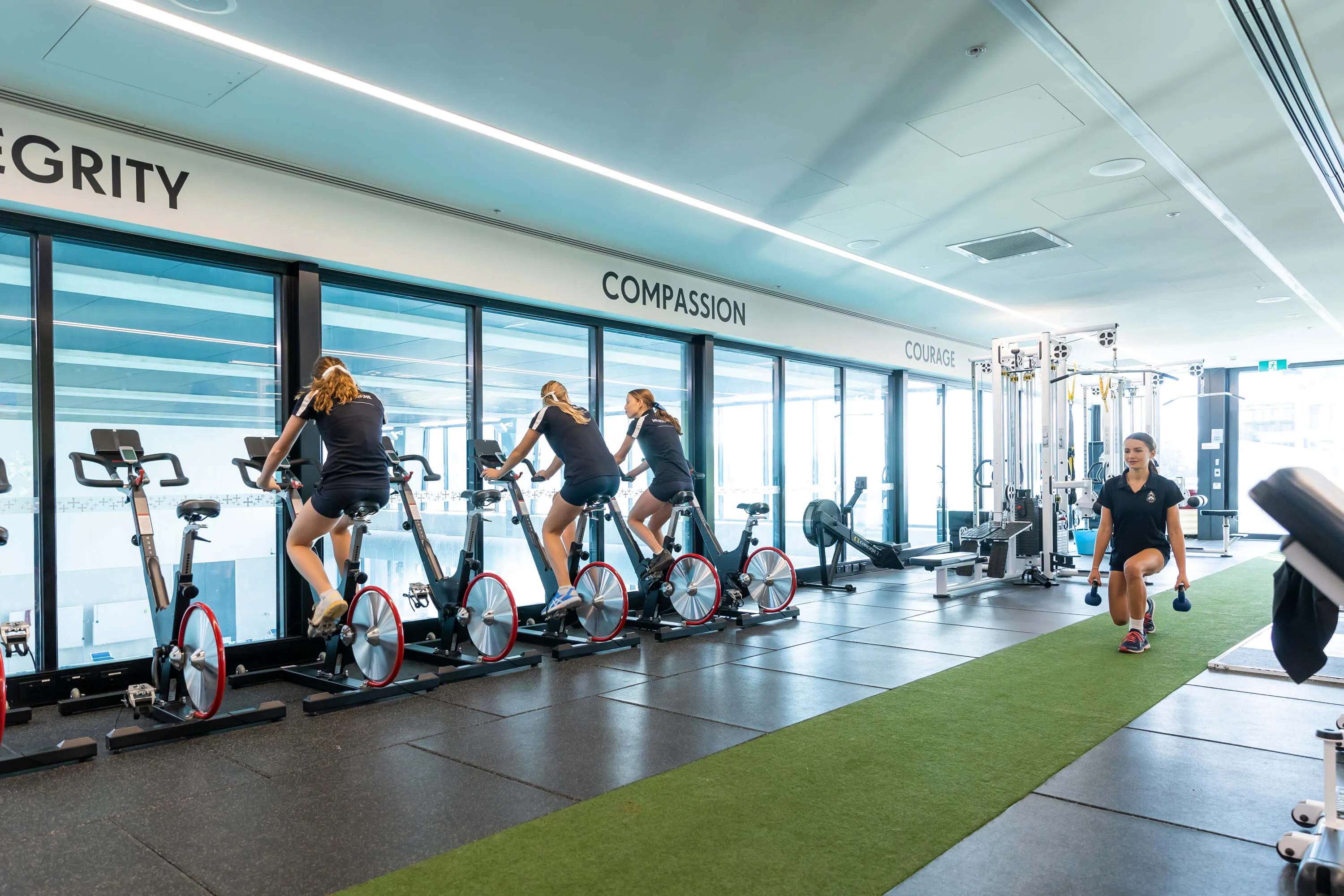

Year 10 and 11 students Sophie, Pippa, Anouk and Tess workout. Dedicated spaces like the fitness hub give students a chance to learn physical literacy.


The Artemis Team Zone allows our Grammarians to learn and play a number of different sports and skills.


The Artemis pool is a space where coaches teach and students learn the valuable skill of swimming.


Year 10 and 11 students Sophie, Pippa, Anouk and Tess workout. Dedicated spaces like the fitness hub give students a chance to learn physical literacy.
Beginning with the build and launch of our home-grown Artemis Aquatics and Artemis Gymnastics in 2018, Artemis Programs have continued to evolve over the past five years to encompass a comprehensive suite of offerings and physical pathways. These offerings are designed to develop foundational skills and positive experiences across team sports, athletic pursuits, artistic movement, as well as more extreme sports and adventurous endeavours.
Our youngest Grammarians can start their physical journeys with athletics, learn to swim, snowsports, netball, and gymnastics – arguably activities which form the basis for transferable skill acquisition, physical development, and movement competencies. What is most rewarding and valuable about these programs is that our youngest and oldest Grammarians interact, role model, and learn from each other in shared environments.
Artemis is our commitment to nurture the learning, inspiration, and growth in our students, which allows them to be the person they want to be. We achieve that by developing competence, fostering confidence, creating positive connections, building character, and encouraging creativity. We do this through effective and caring coaching, designing deliberate practice, offering a choice and challenge of programs, and championing experiences designed to recognise and value the unique qualities of each student. We recognise their stage and age of development and learning and ensure that the programs, training, and practice are designed to suit the students’ needs rather than assuming our students will adapt to what we have designed.
We know that development isn’t linear. Charlotte’s story is just one example to illustrate the complexity of our physical, mental, and emotional development, resourcefulness, and resilience within the context of learning and performing in sport. We’ve had the honour of witnessing her journey at MGGS, and I have every faith that Charlotte will continue to develop these skills in life beyond 'the red brick walls'.
Everyone’s journey is different but the basis of a positive relationship with physical activity and sport comes from building positive relationships with your coaches, teachers, and peers, and developing essential foundational skills that can be applied in a variety of contexts.
i Sport Australia defines physical literacy as… “the skills, knowledge and behaviours that give us the confidence and motivation to move throughout our lives.” (2018) A growing body of evidence supports the role of physical literacy in the overall qualitative development of a child, and the positive impact this has on their physical, cognitive, social, and emotional wellbeing. By learning the fundamentals of movement and developing a positive attitude to physical activity and sport, people of all ages can gain the skills, experience and attitudes which will allow them to take part in physical activity and sport now and into the future.
Beginning with the build and launch of our home-grown Artemis Aquatics and Artemis Gymnastics in 2018, Artemis Programs have continued to evolve over the past five years to encompass a comprehensive suite of offerings and physical pathways. These offerings are designed to develop foundational skills and positive experiences across team sports, athletic pursuits, artistic movement, as well as more extreme sports and adventurous endeavours.
Our youngest Grammarians can start their physical journeys with athletics, learn to swim, snowsports, netball, and gymnastics – arguably activities which form the basis for transferable skill acquisition, physical development, and movement competencies. What is most rewarding and valuable about these programs is that our youngest and oldest Grammarians interact, role model, and learn from each other in shared environments.
Artemis is our commitment to nurture the learning, inspiration, and growth in our students, which allows them to be the person they want to be. We achieve that by developing competence, fostering confidence, creating positive connections, building character, and encouraging creativity. We do this through effective and caring coaching, designing deliberate practice, offering a choice and challenge of programs, and championing experiences designed to recognise and value the unique qualities of each student. We recognise their stage and age of development and learning and ensure that the programs, training, and practice are designed to suit the students’ needs rather than assuming our students will adapt to what we have designed.
We know that development isn’t linear. Charlotte’s story is just one example to illustrate the complexity of our physical, mental, and emotional development, resourcefulness, and resilience within the context of learning and performing in sport. We’ve had the honour of witnessing her journey at MGGS, and I have every faith that Charlotte will continue to develop these skills in life beyond 'the red brick walls'.
Everyone’s journey is different but the basis of a positive relationship with physical activity and sport comes from building positive relationships with your coaches, teachers, and peers, and developing essential foundational skills that can be applied in a variety of contexts.
i Sport Australia defines physical literacy as… “the skills, knowledge and behaviours that give us the confidence and motivation to move throughout our lives.” (2018) A growing body of evidence supports the role of physical literacy in the overall qualitative development of a child, and the positive impact this has on their physical, cognitive, social, and emotional wellbeing. By learning the fundamentals of movement and developing a positive attitude to physical activity and sport, people of all ages can gain the skills, experience and attitudes which will allow them to take part in physical activity and sport now and into the future.
Beginning with the build and launch of our home-grown Artemis Aquatics and Artemis Gymnastics in 2018, Artemis Programs have continued to evolve over the past five years to encompass a comprehensive suite of offerings and physical pathways. These offerings are designed to develop foundational skills and positive experiences across team sports, athletic pursuits, artistic movement, as well as more extreme sports and adventurous endeavours.
Our youngest Grammarians can start their physical journeys with athletics, learn to swim, snowsports, netball, and gymnastics – arguably activities which form the basis for transferable skill acquisition, physical development, and movement competencies. What is most rewarding and valuable about these programs is that our youngest and oldest Grammarians interact, role model, and learn from each other in shared environments.
Artemis is our commitment to nurture the learning, inspiration, and growth in our students, which allows them to be the person they want to be. We achieve that by developing competence, fostering confidence, creating positive connections, building character, and encouraging creativity. We do this through effective and caring coaching, designing deliberate practice, offering a choice and challenge of programs, and championing experiences designed to recognise and value the unique qualities of each student. We recognise their stage and age of development and learning and ensure that the programs, training, and practice are designed to suit the students’ needs rather than assuming our students will adapt to what we have designed.
We know that development isn’t linear. Charlotte’s story is just one example to illustrate the complexity of our physical, mental, and emotional development, resourcefulness, and resilience within the context of learning and performing in sport. We’ve had the honour of witnessing her journey at MGGS, and I have every faith that Charlotte will continue to develop these skills in life beyond 'the red brick walls'.
Everyone’s journey is different but the basis of a positive relationship with physical activity and sport comes from building positive relationships with your coaches, teachers, and peers, and developing essential foundational skills that can be applied in a variety of contexts.
i Sport Australia defines physical literacy as… “the skills, knowledge and behaviours that give us the confidence and motivation to move throughout our lives.” (2018) A growing body of evidence supports the role of physical literacy in the overall qualitative development of a child, and the positive impact this has on their physical, cognitive, social, and emotional wellbeing. By learning the fundamentals of movement and developing a positive attitude to physical activity and sport, people of all ages can gain the skills, experience and attitudes which will allow them to take part in physical activity and sport now and into the future.
The Artemis Team Zone allows our Grammarians to learn and play a number of different sports and skills.







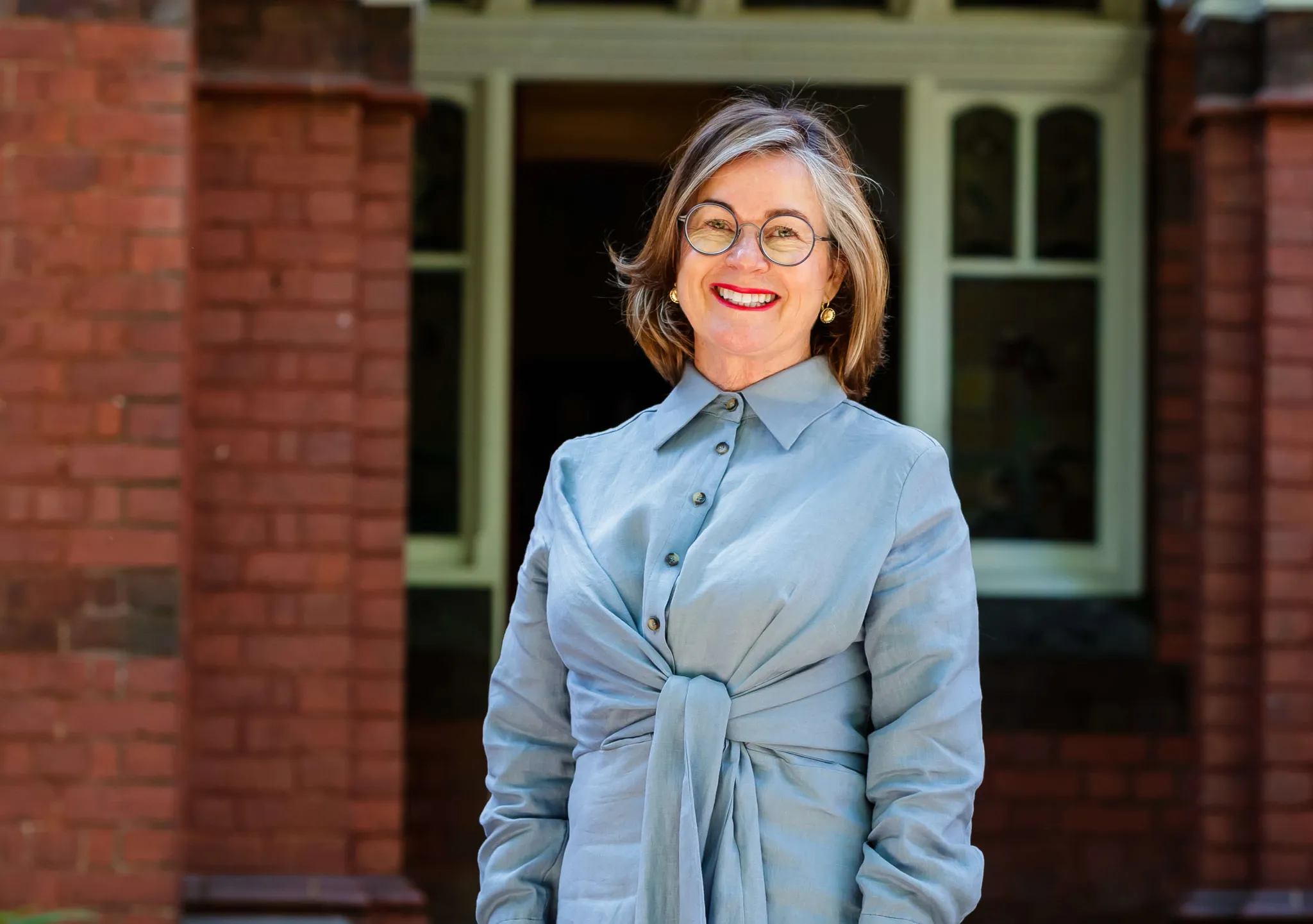
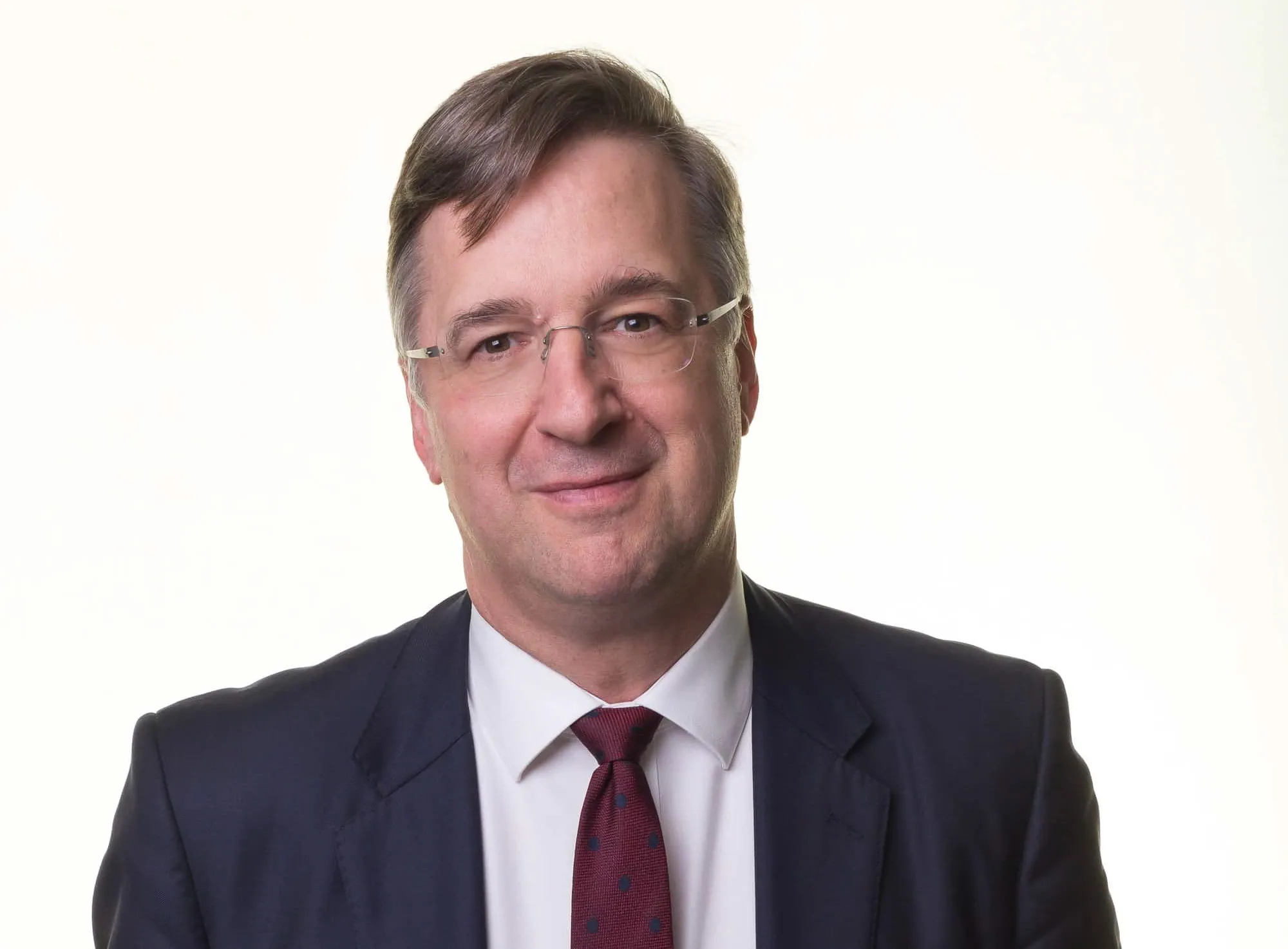
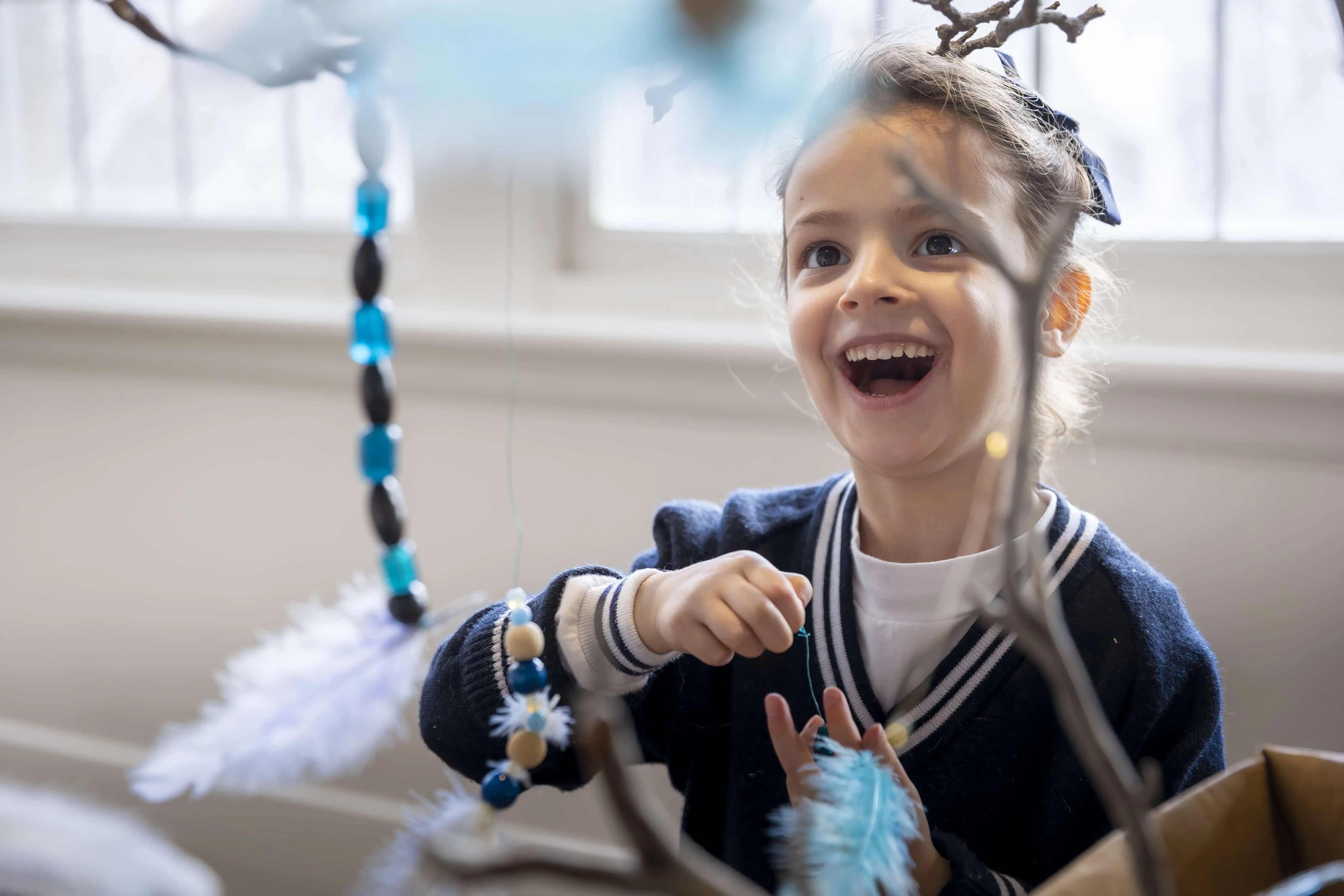
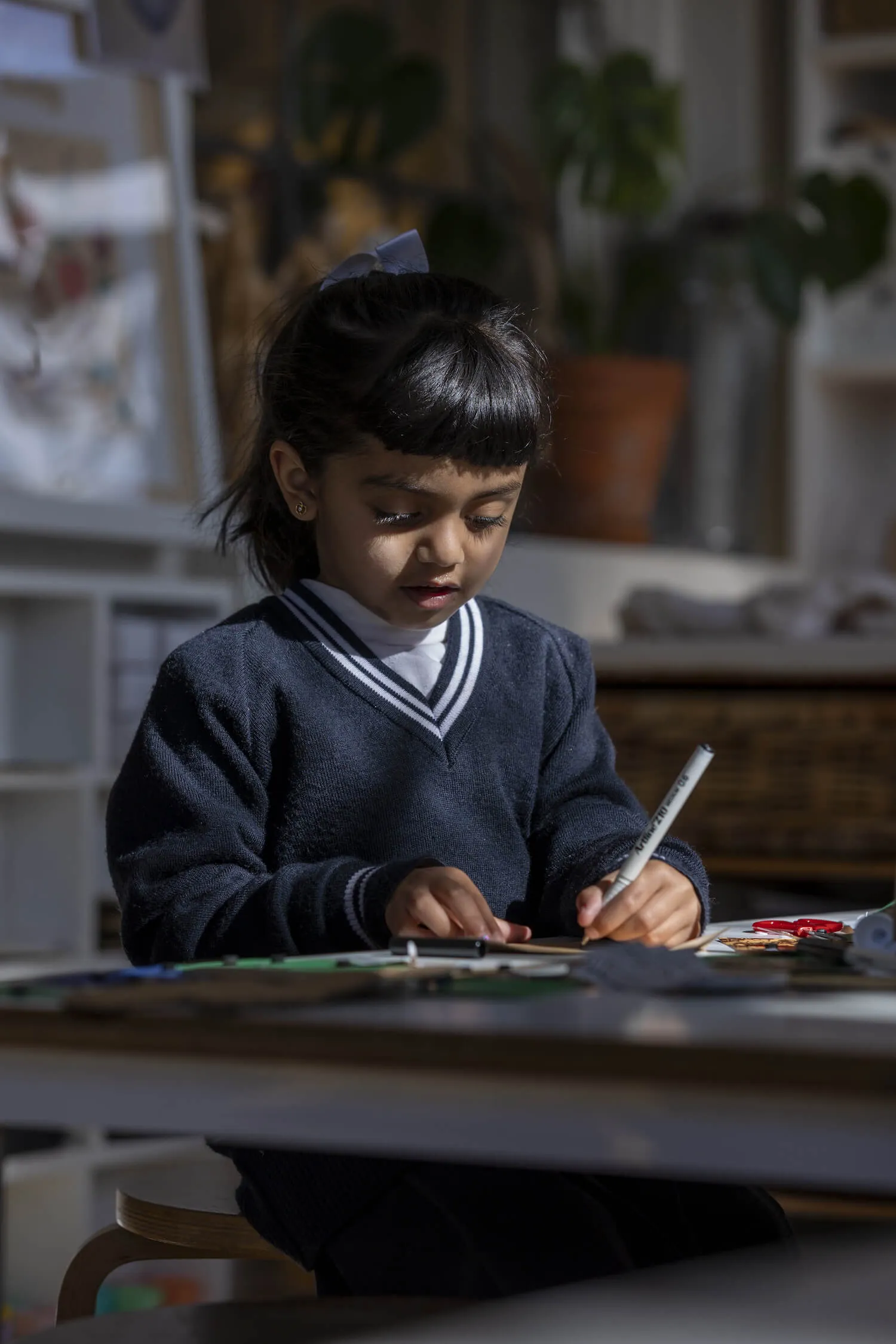
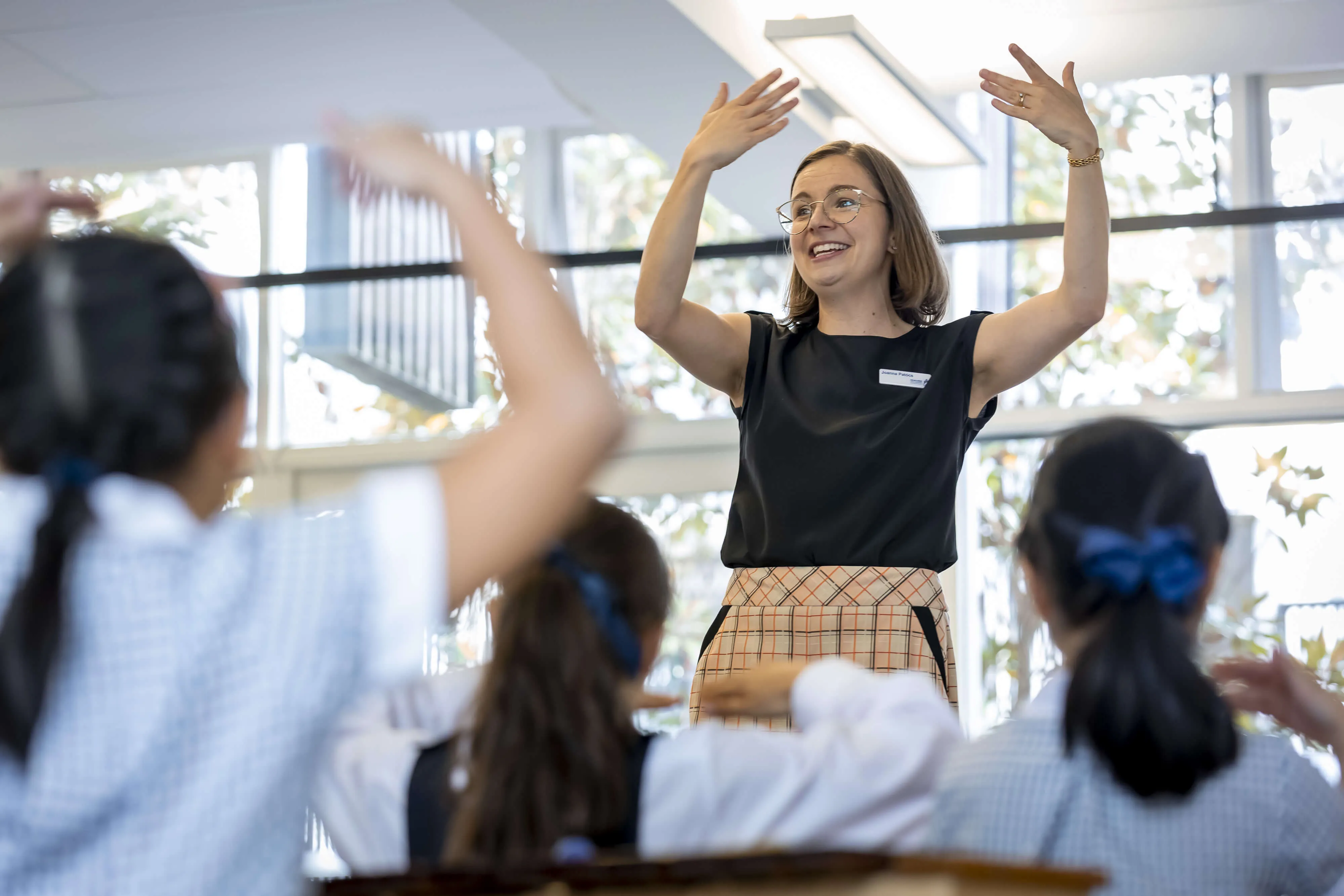
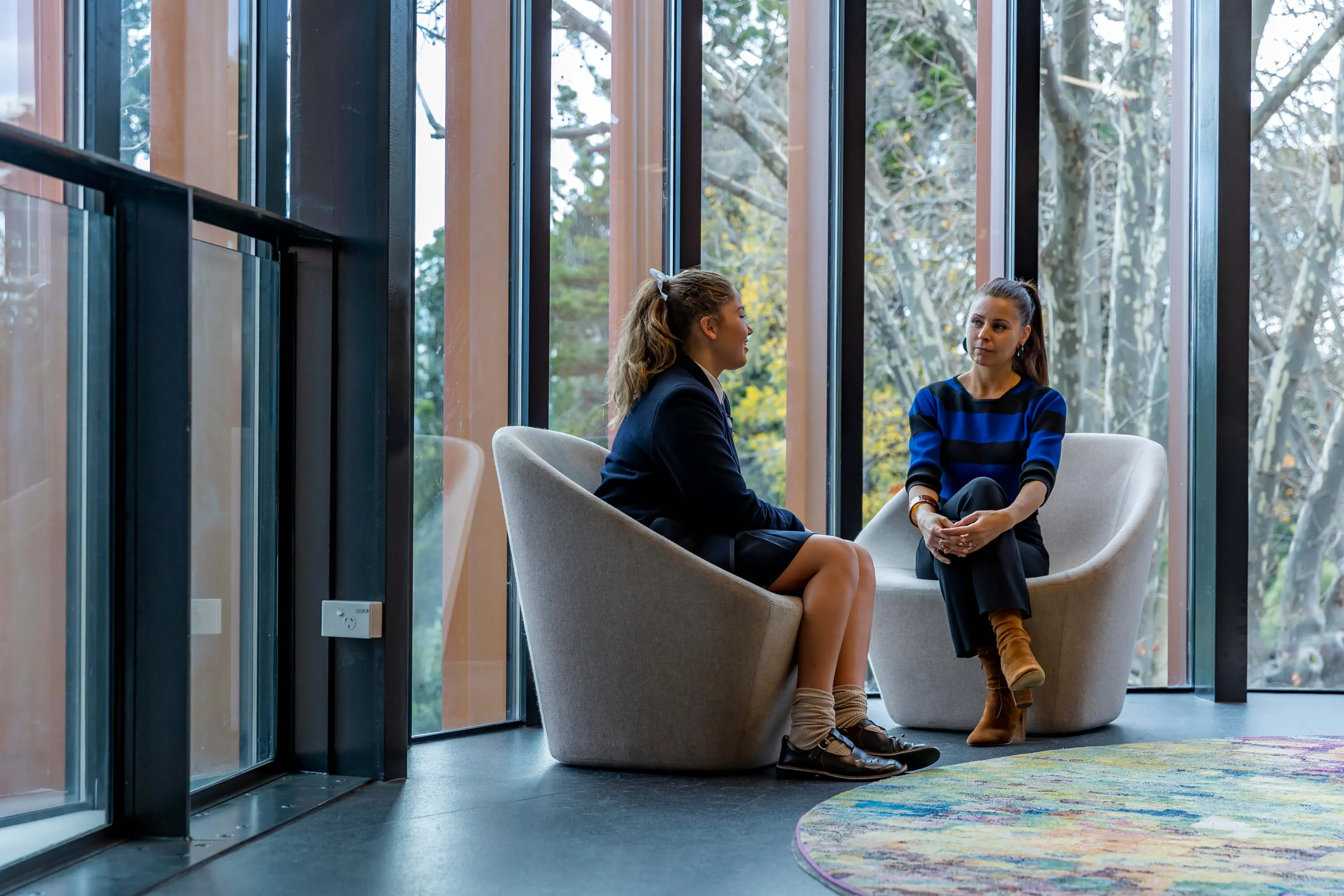
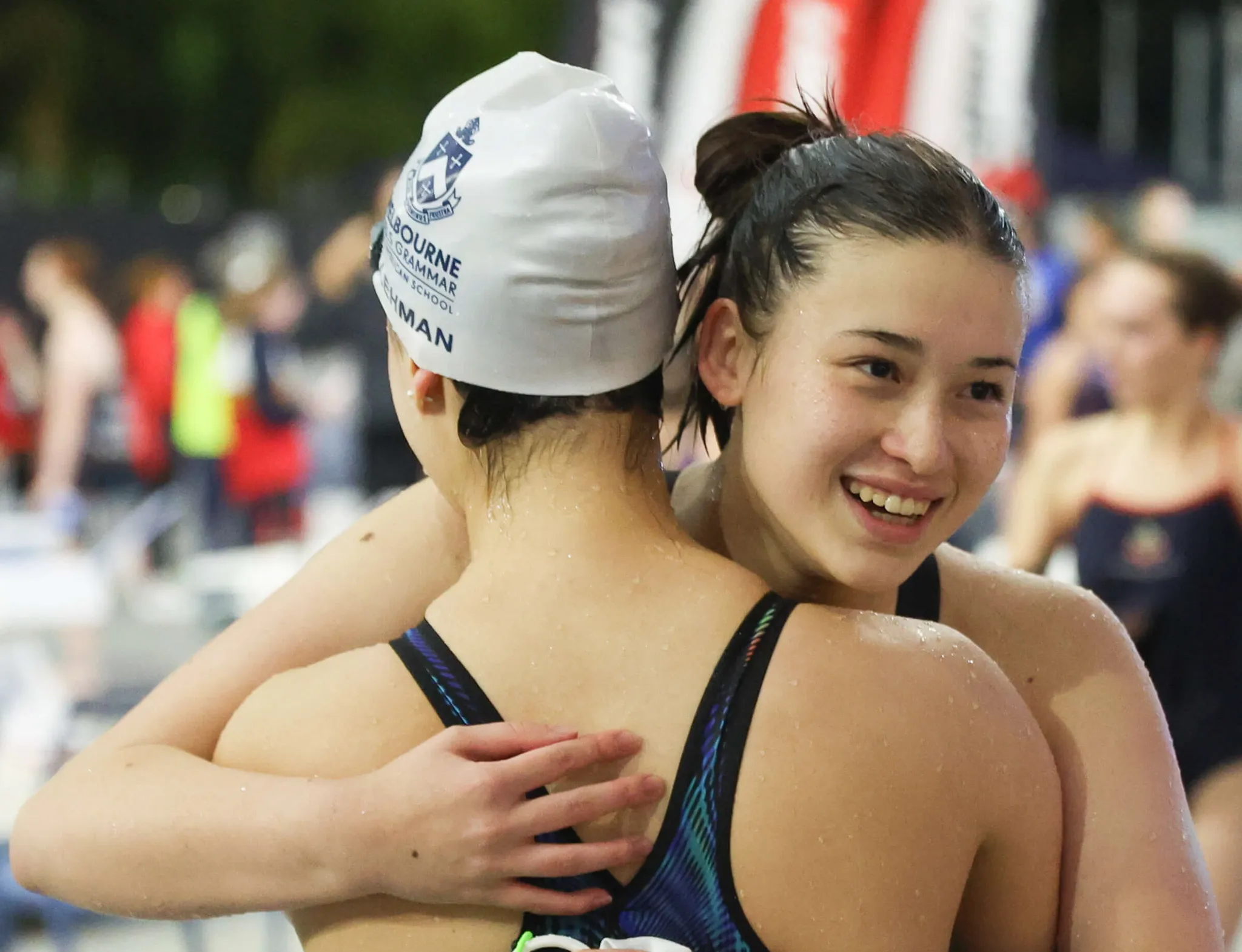
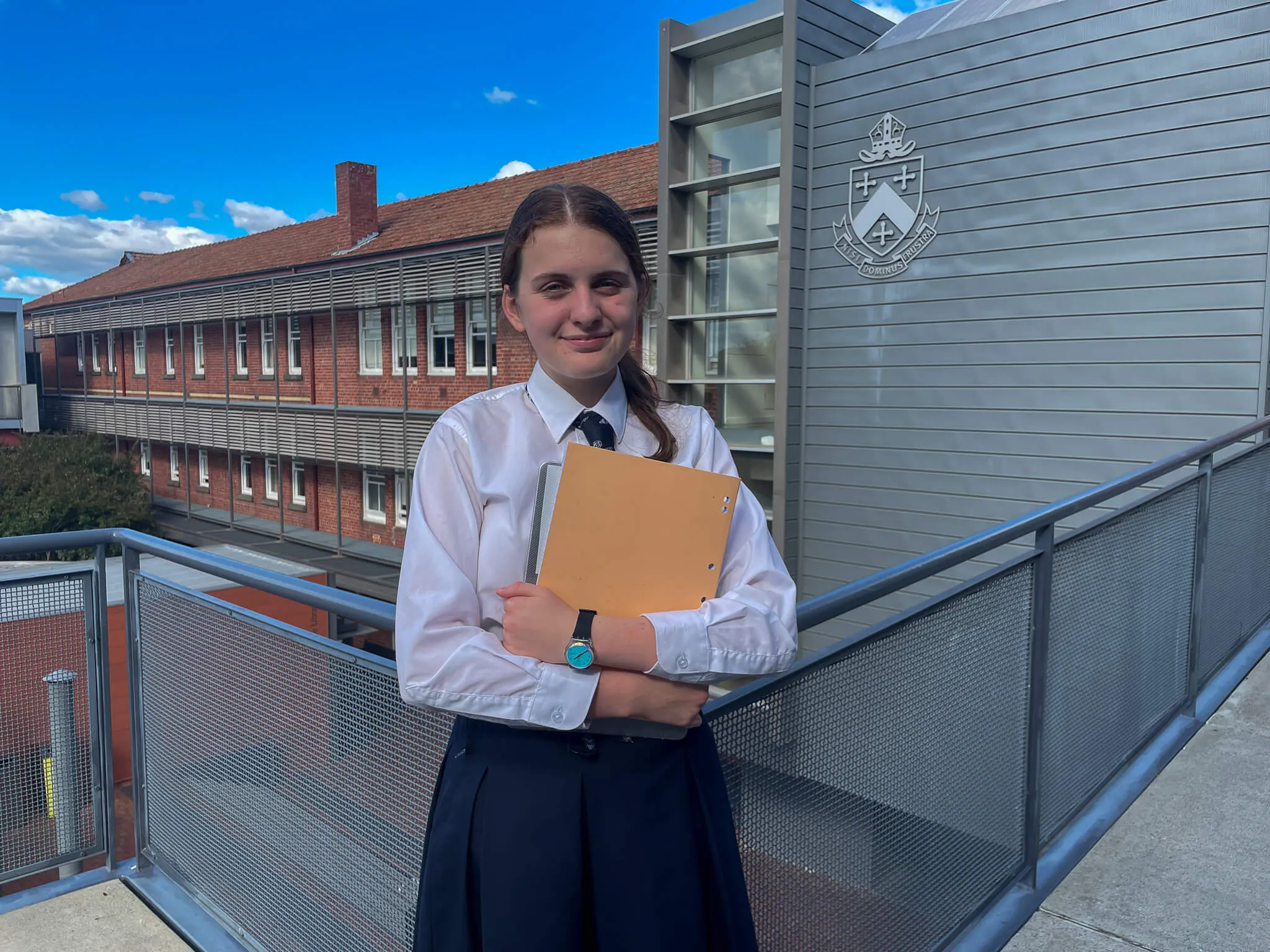
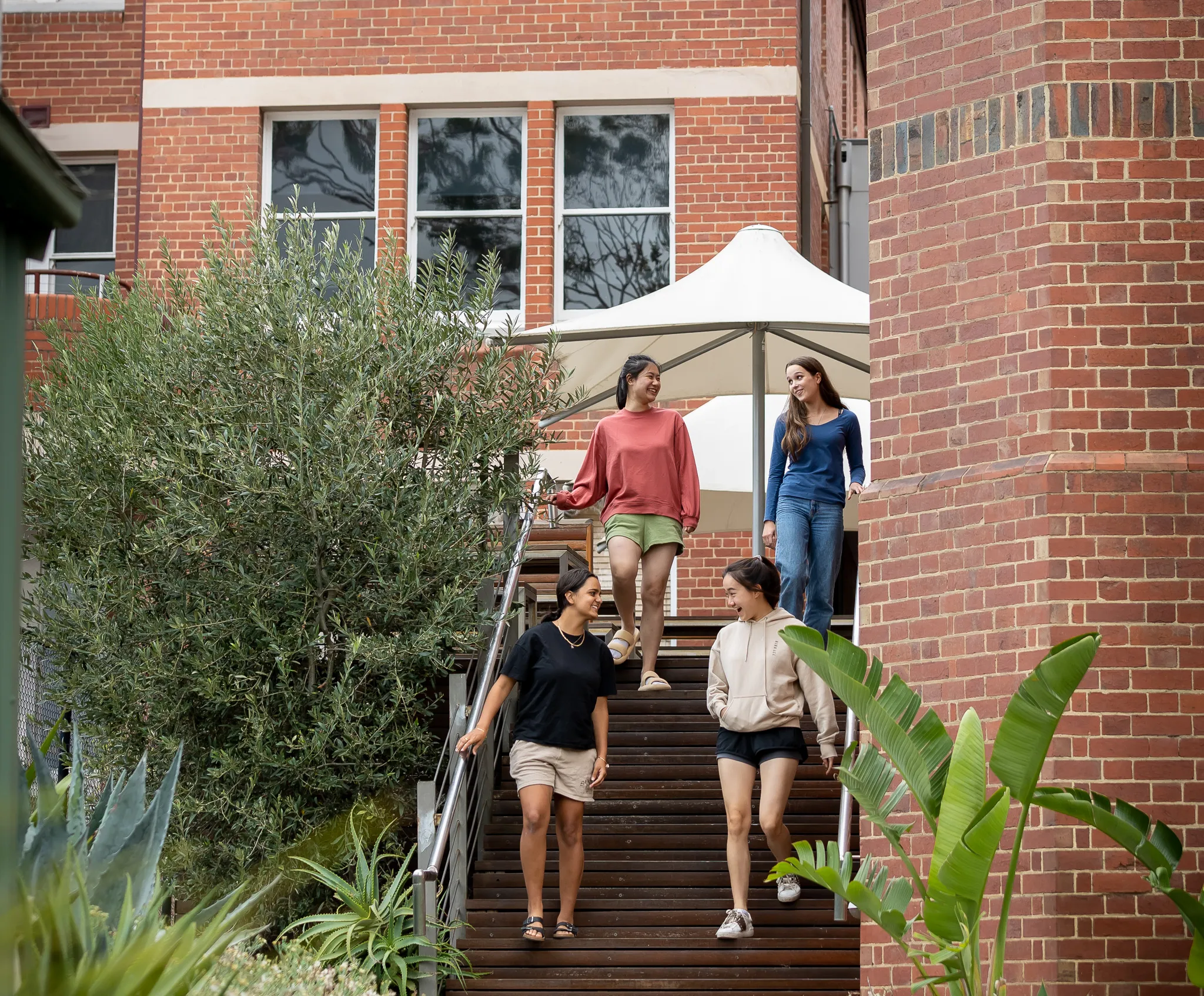
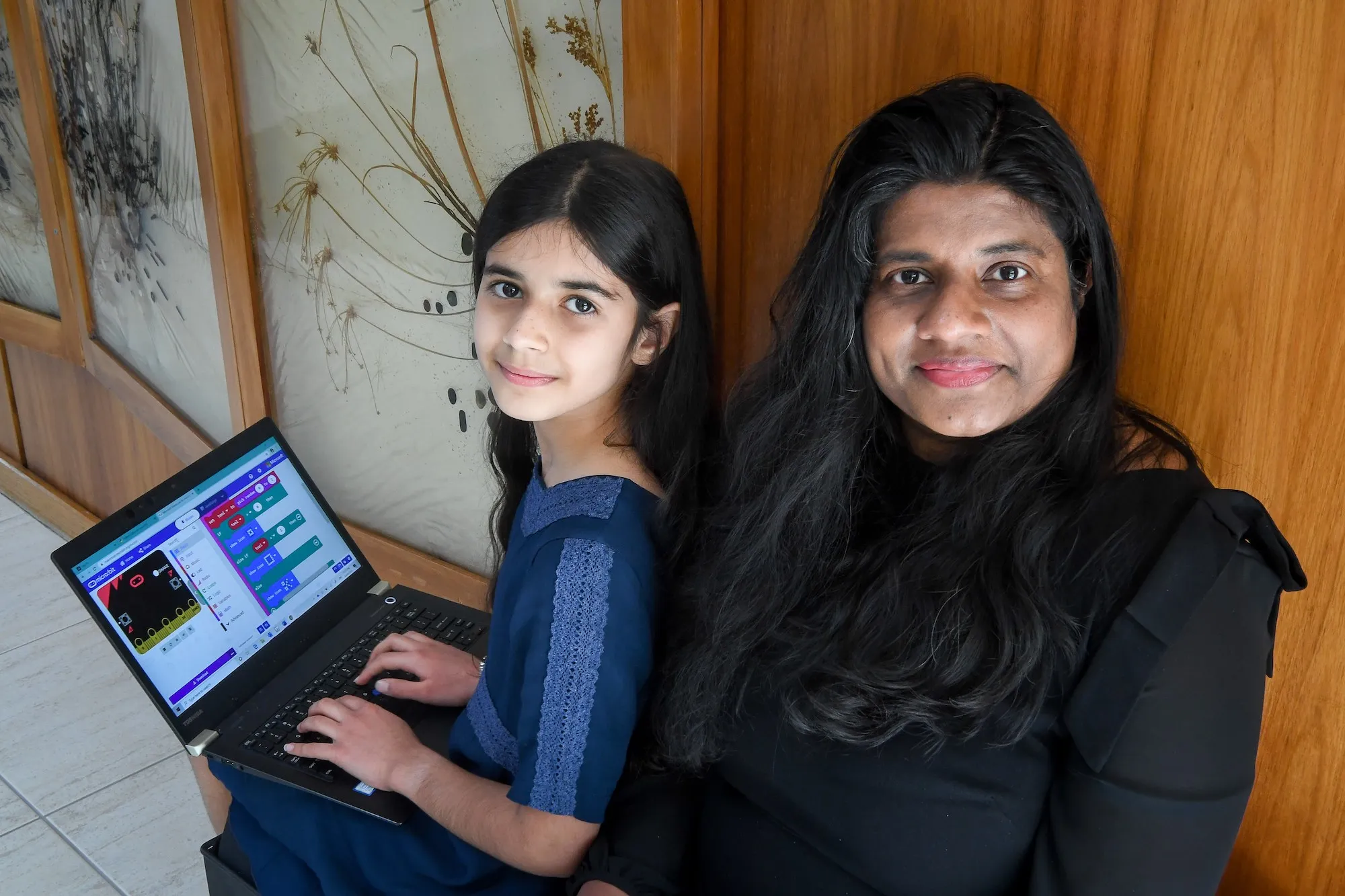
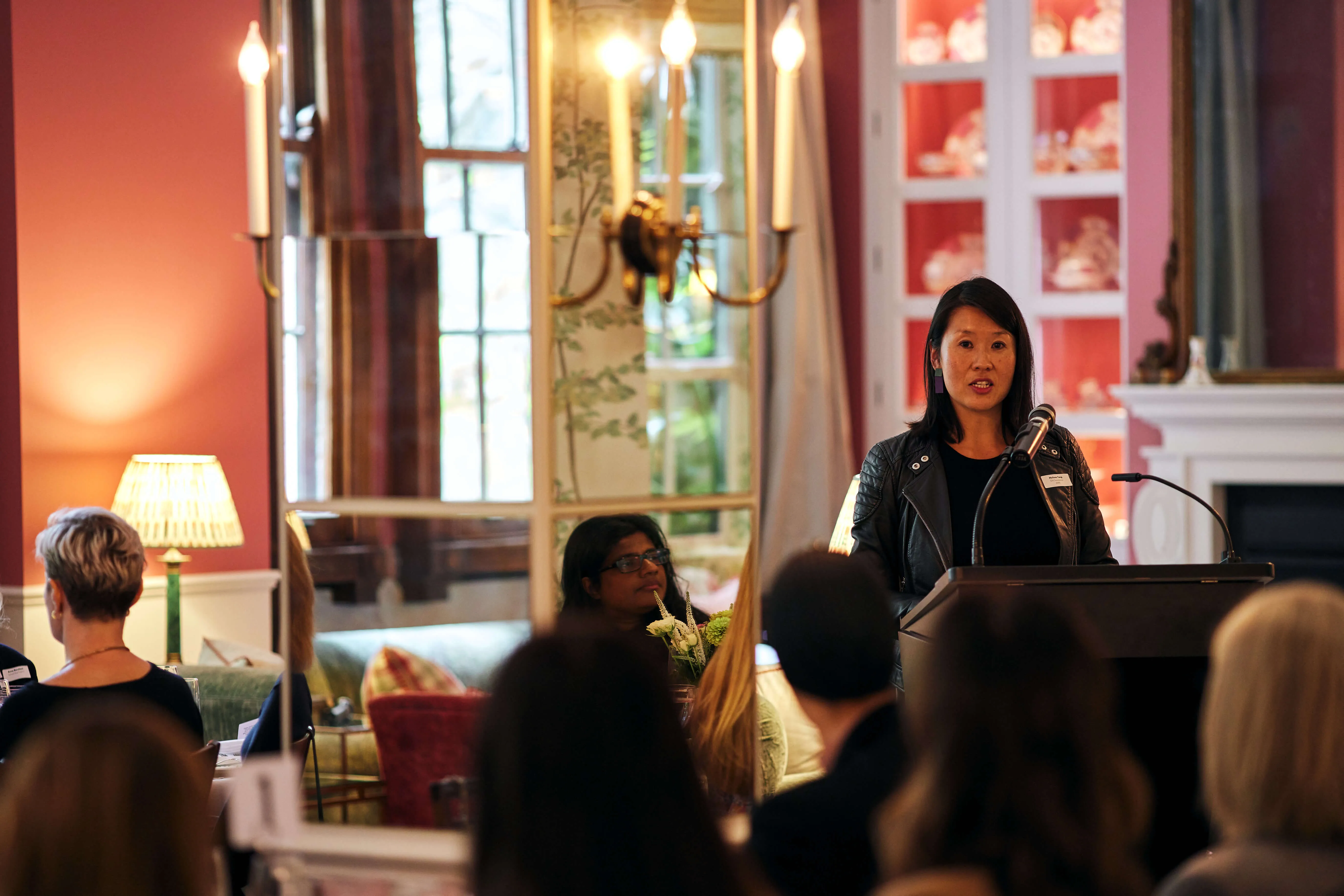
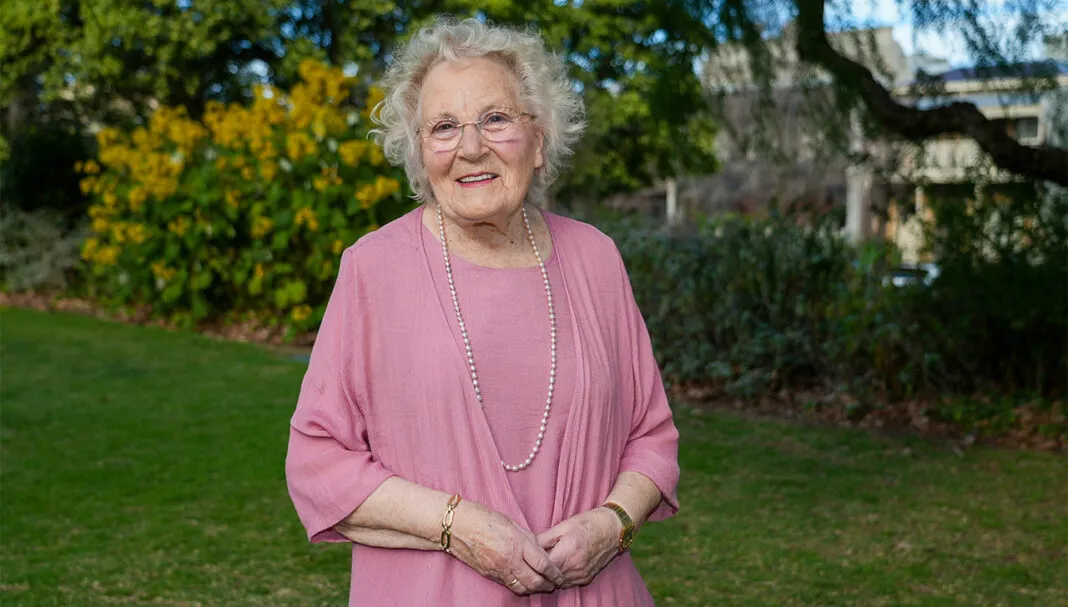

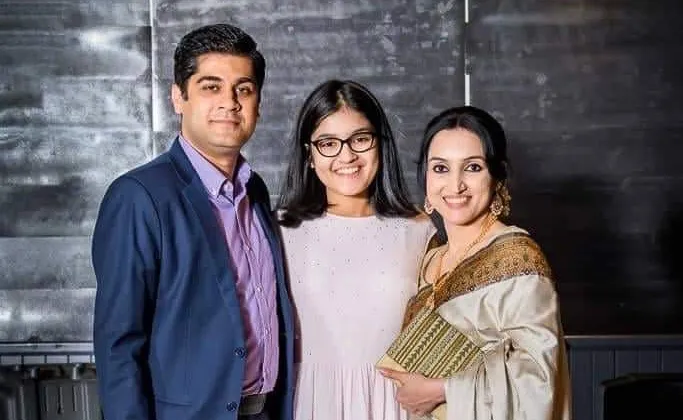


%20in%20Year%205%20after%20winning%20a%20medalJPG.webp)
